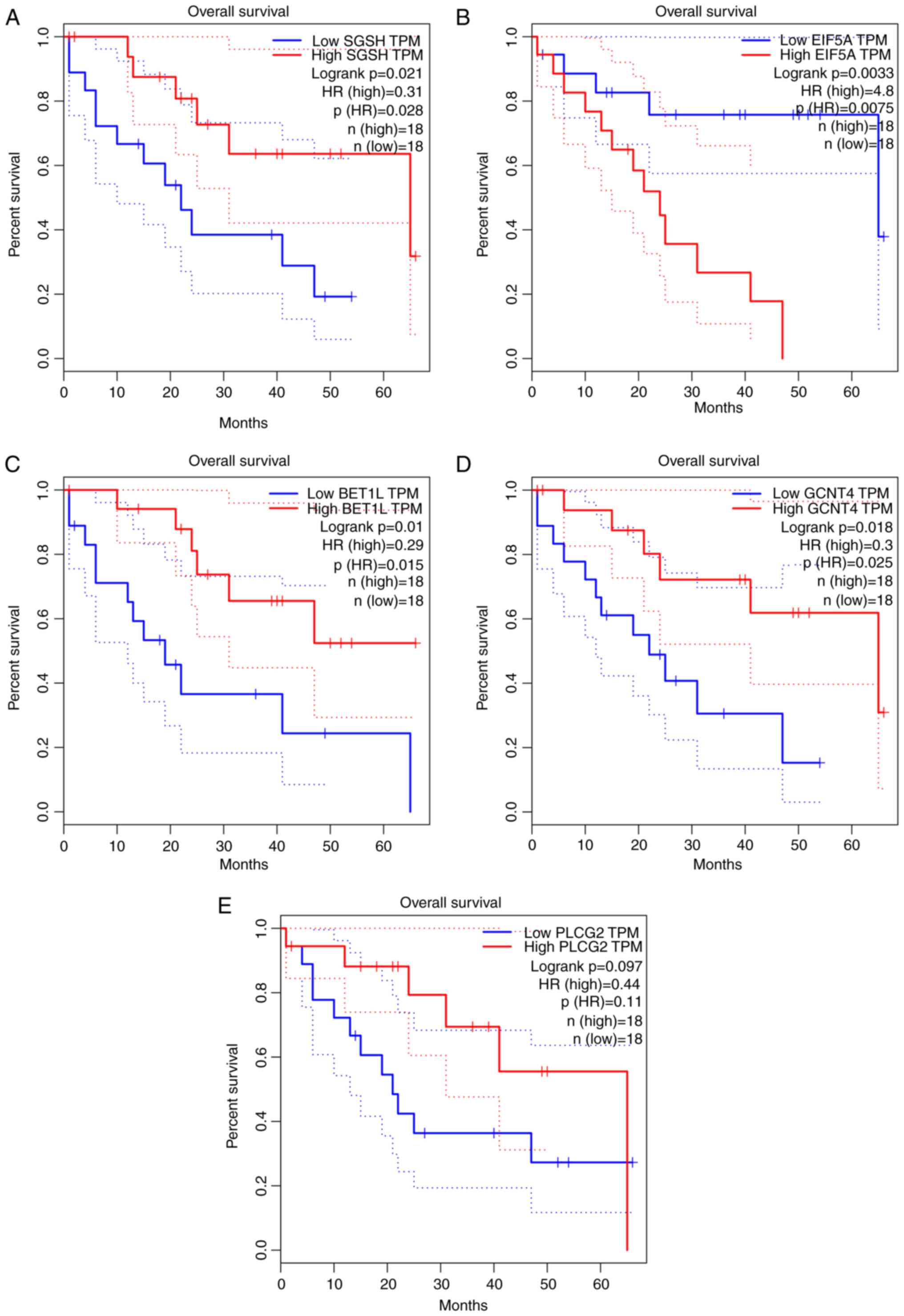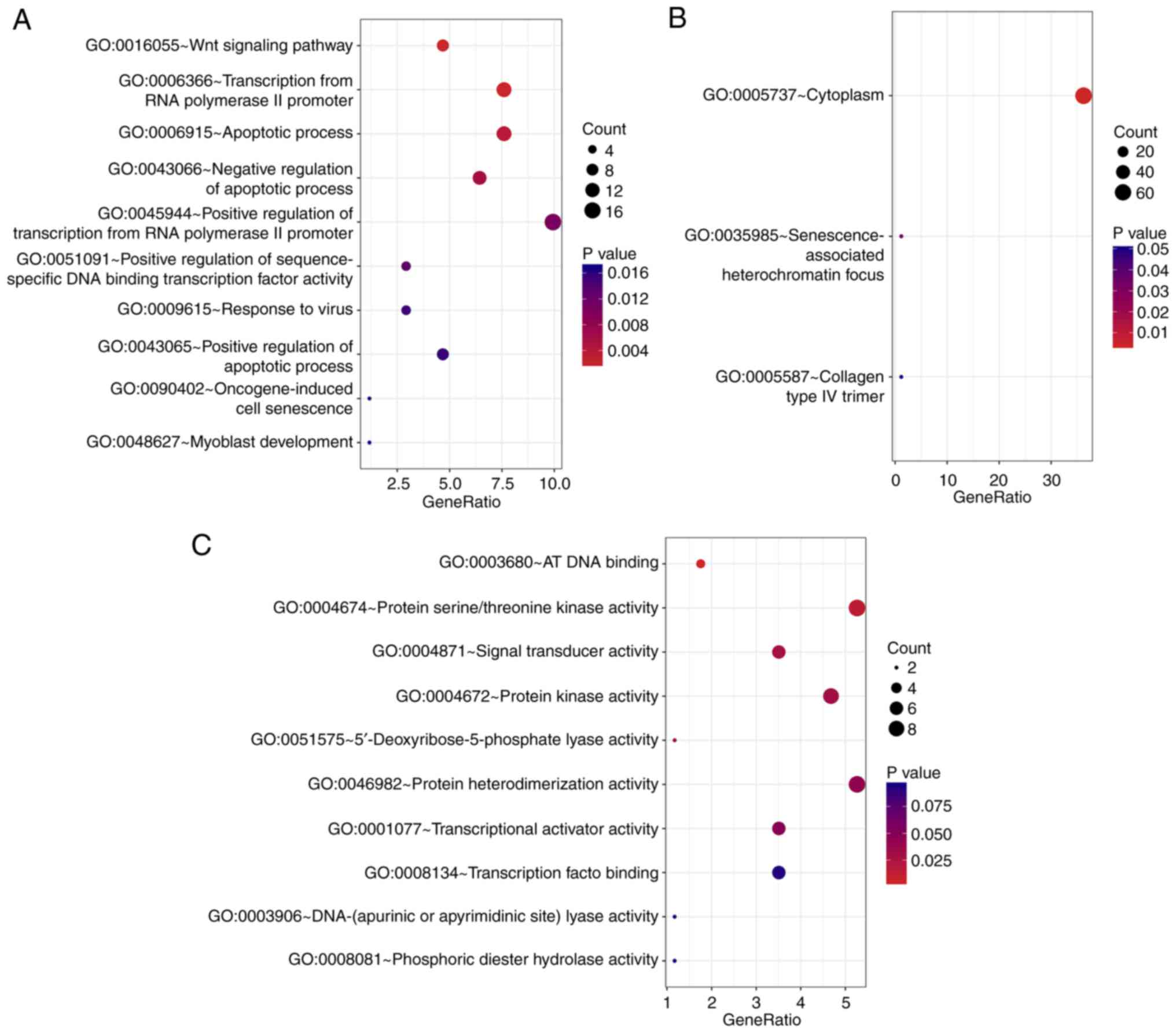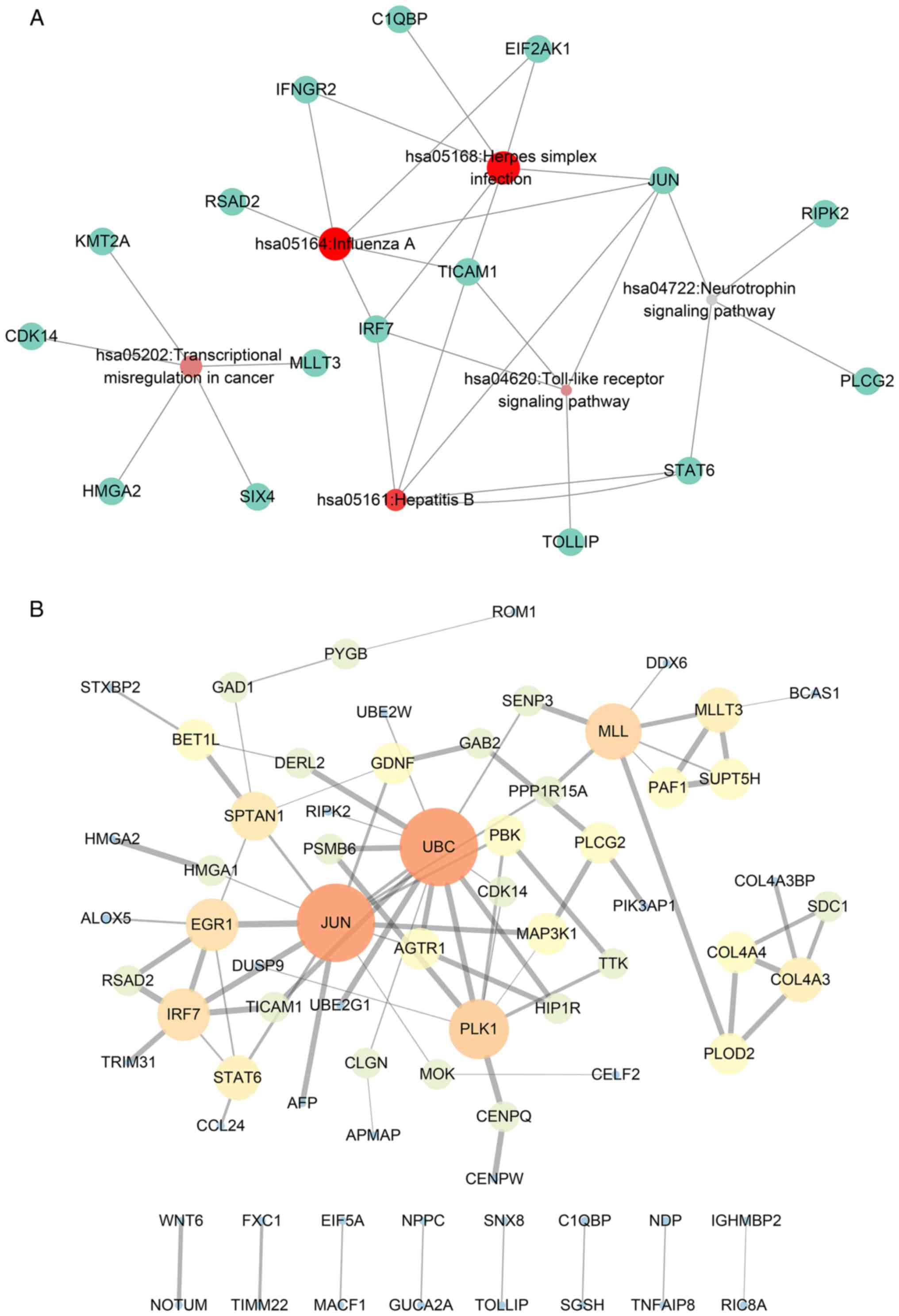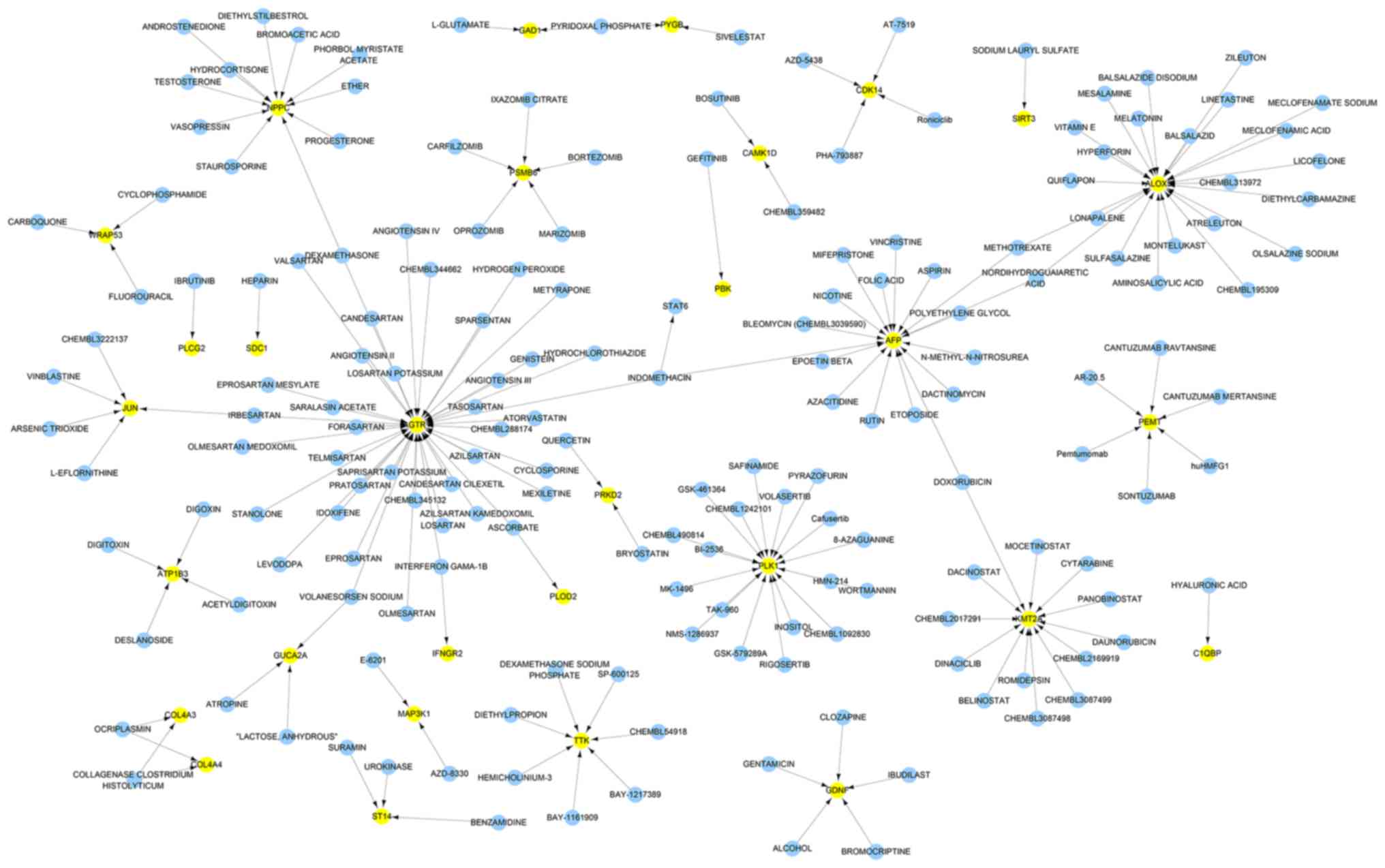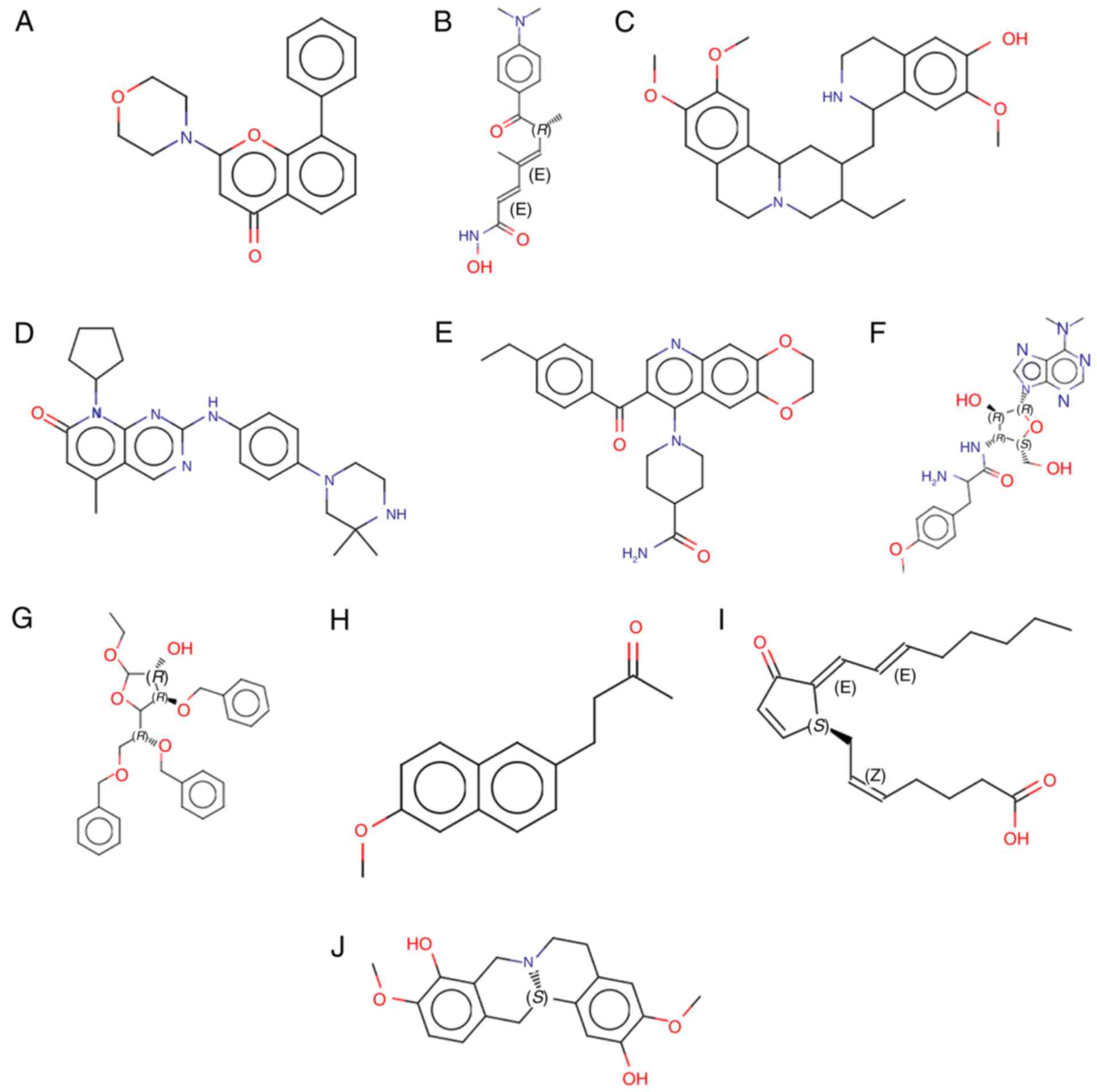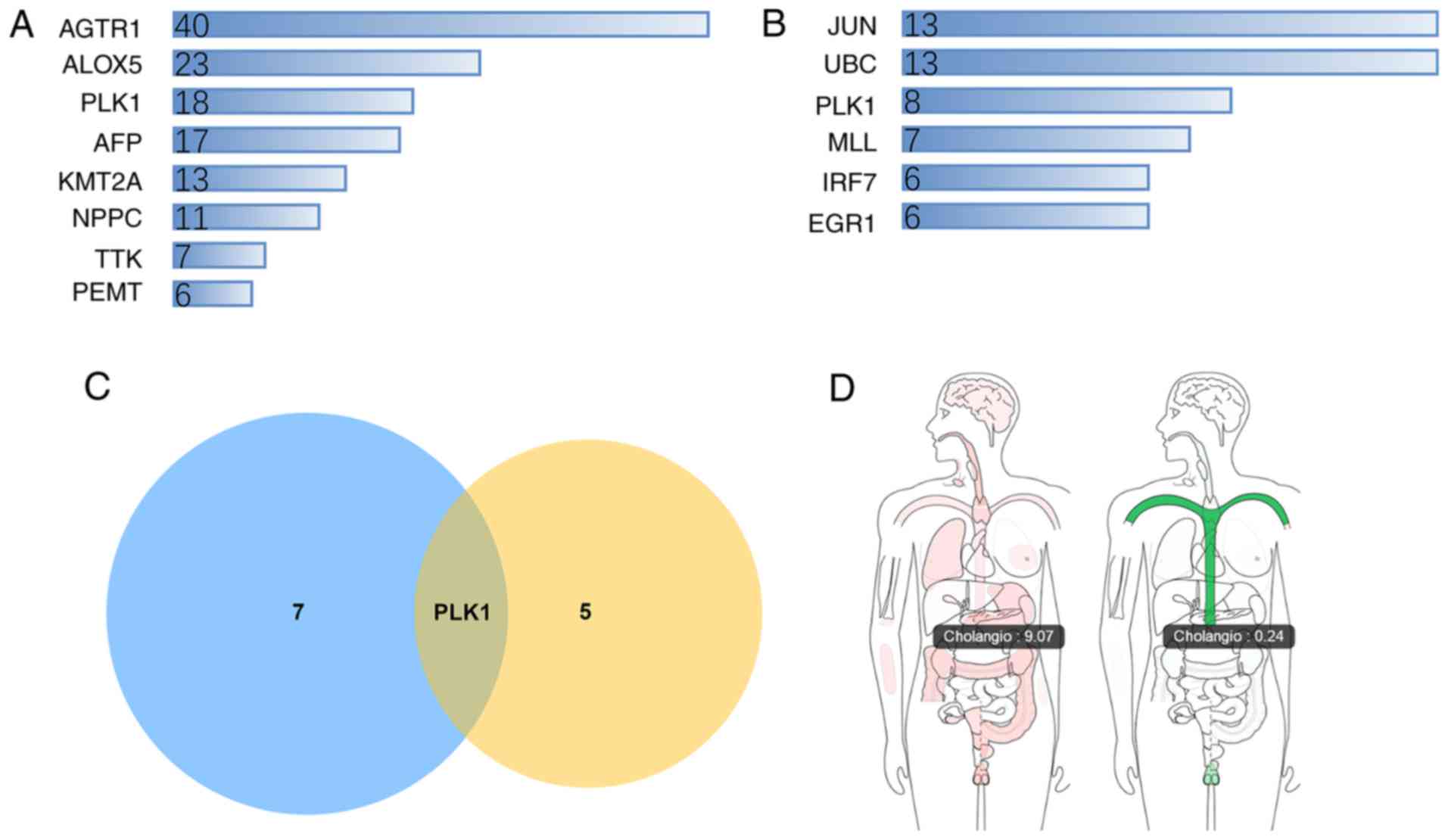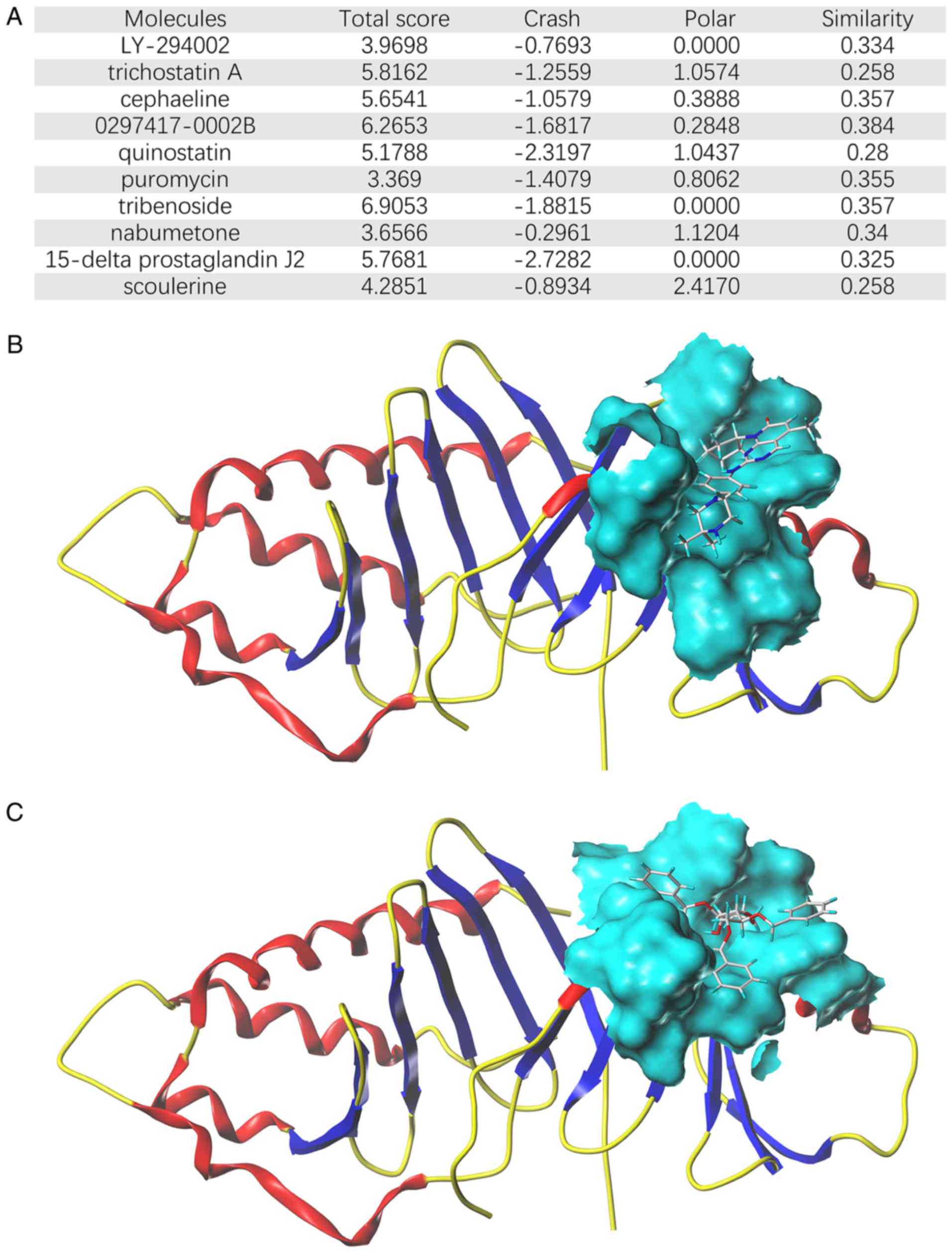|
1
|
Kaneko R, Sato Y and Kobayashi Y:
Cholangiocarcinoma prognosis varies over time depending on tumor
site and pathology. J Gastrointestin Liver Dis. 27:59–66.
2018.PubMed/NCBI
|
|
2
|
Razumilava N and Gores GJ:
Cholangiocarcinoma. Lancet. 383:2168–2179. 2014. View Article : Google Scholar : PubMed/NCBI
|
|
3
|
Siegel RL, Miller KD and Jemal A: Cancer
statistics, 2018. CA Cancer J Clin. 68:7–30. 2018. View Article : Google Scholar : PubMed/NCBI
|
|
4
|
Ikeno Y, Seo S, Iwaisako K, Yoh T,
Nakamoto Y, Fuji H, Taura K, Okajima H, Kaido T, Sakaguchi S and
Uemoto S: Preoperative metabolic tumor volume of intrahepatic
cholangiocarcinoma measured by 18F-FDG-PET is associated
with the KRAS mutation status and prognosis. J Transl Med.
16:952018. View Article : Google Scholar : PubMed/NCBI
|
|
5
|
DeOliveira ML, Cunningham SC, Cameron JL,
Kamangar F, Winter JM, Lillemoe KD, Choti MA, Yeo CJ and Schulick
RD: Cholangiocarcinoma: Thirty-one-year experience with 564
patients at a single institution. Ann Surg. 245:755–762. 2007.
View Article : Google Scholar : PubMed/NCBI
|
|
6
|
Wang Y, Li J, Xia Y, Gong R, Wang K, Yan
Z, Wan X, Liu G, Wu D, Shi L, et al: Prognostic nomogram for
intrahepatic cholangiocarcinoma after partial hepatectomy. J Clin
Oncol. 31:1188–1195. 2013. View Article : Google Scholar : PubMed/NCBI
|
|
7
|
Endo I, Gonen M, Yopp AC, Dalal KM, Zhou
Q, Klimstra D, D'Angelica M, DeMatteo RP, Fong Y, Schwartz L, et
al: Intrahepatic cholangiocarcinoma: Rising frequency, improved
survival, and determinants of outcome after resection. Ann Surg.
248:84–96. 2008. View Article : Google Scholar : PubMed/NCBI
|
|
8
|
Alvaro D, Crocetti E, Ferretti S, Bragazzi
MC and Capocaccia R: AISF Cholangiocarcinoma committee: Descriptive
epidemiology of cholangiocarcinoma in Italy. Dig Liver Dis.
42:490–495. 2010. View Article : Google Scholar : PubMed/NCBI
|
|
9
|
Khan SA, Davidson BR, Goldin RD, Heaton N,
Karani J, Pereira SP, Rosenberg WM, Tait P, Taylor-Robinson SD,
Thillainayagam AV, et al: Guidelines for the diagnosis and
treatment of cholangiocarcinoma: An update. Gut. 61:1657–1669.
2012. View Article : Google Scholar : PubMed/NCBI
|
|
10
|
Sombut S, Bunthawong R, Sirion U, Kasemsuk
T, Piyachaturawat P, Suksen K, Suksamrarn A and Saeeng R: Synthesis
of 14-deoxy-11,12-didehydroandrographolide analogues as potential
cytotoxic agents for cholangiocarcinoma. Bioorg Med Chem Lett.
27:5139–5143. 2017. View Article : Google Scholar : PubMed/NCBI
|
|
11
|
Hu RW, Carey EJ, Lindor KD and Tabibian
JH: Curcumin in hepatobiliary disease: Pharmacotherapeutic
properties and emerging potential clinical applications. Ann
Hepatol. 16:835–841. 2017. View Article : Google Scholar : PubMed/NCBI
|
|
12
|
Tampellini M, La Salvia A and Scagliotti
GV: Novel investigational therapies for treating biliary tract
carcinoma. Expert Opin Investig Drugs. 25:1423–1436. 2016.
View Article : Google Scholar : PubMed/NCBI
|
|
13
|
Lamb J: The Connectivity Map: A new tool
for biomedical research. Nat Rev Cancer. 7:54–60. 2007. View Article : Google Scholar : PubMed/NCBI
|
|
14
|
Wagner AH, Coffman AC, Ainscough BJ, Spies
NC, Skidmore ZL, Campbell KM, Krysiak K, Pan D, McMichael JF,
Eldred JM, et al: DGIdb 2.0: Mining clinically relevant drug-gene
interactions. Nucleic Acids Res. 44:D1036–D1044. 2016. View Article : Google Scholar : PubMed/NCBI
|
|
15
|
Sangsin A, Saiudom D, Pongmanee S,
Saengsin J, Leerapun T and Murakami H: Natural history and
prognostic factors of cholangiocarcinoma with spinal metastasis: A
10-year single center study. Clin Spine Surg. 31:E160–E165. 2018.
View Article : Google Scholar : PubMed/NCBI
|
|
16
|
Ouesleti S, Coutinho MF, Ribeiro I, Miled
A, Mosbahi DS and Alves S: Update of the spectrum of
mucopolysaccharidoses type III in Tunisia: Identification of three
novel mutations and in silico structural analysis of the missense
mutations. World J Pediatr. 13:374–380. 2017. View Article : Google Scholar : PubMed/NCBI
|
|
17
|
Pelechano V and Alepuz P: eIF5A
facilitates translation termination globally and promotes the
elongation of many non polyproline-specific tripeptide sequences.
Nucleic Acids Res. 45:7326–7338. 2017. View Article : Google Scholar : PubMed/NCBI
|
|
18
|
Pinho SS and Reis CA: Glycosylation in
cancer: Mechanisms and clinical implications. Nat Rev Cancer.
15:540–555. 2015. View
Article : Google Scholar : PubMed/NCBI
|
|
19
|
Jones D, Woyach JA, Zhao W, Caruthers S,
Tu H, Coleman J, Byrd JC, Johnson AJ and Lozanski G: PLCG2 C2
domain mutations co-occur with BTK and PLCG2 resistance mutations
in chronic lymphocytic leukemia undergoing ibrutinib treatment.
Leukemia. 31:1645–1647. 2017. View Article : Google Scholar : PubMed/NCBI
|
|
20
|
Ely KA, Bischoff LA and Weiss VL: Wnt
signaling in thyroid homeostasis and carcinogenesis. Genes. 9:pii:
E2042018. View Article : Google Scholar
|
|
21
|
Jiang J, Protopopov A, Sun R, Lyle S and
Russell M: Genomic profiling on an unselected solid tumor
population reveals a highly mutated Wnt/β-catenin pathway
associated with oncogenic EGFR mutations. J Pers Med. 8:pii:
E132018. View Article : Google Scholar
|
|
22
|
Mao X, Duan X and Jiang B: Fascin induces
epithelial-mesenchymal transition of cholangiocarcinoma cells by
regulating wnt/β-catenin signaling. Med Sci Monit. 22:3479–3485.
2016. View Article : Google Scholar : PubMed/NCBI
|
|
23
|
Noll AT, Cramer T, Damink Olde SW and
Schaap FG: Cholangiocarcinoma, gone without the Wnt? World J
Hepatol. 8:1093–1096. 2016. View Article : Google Scholar : PubMed/NCBI
|
|
24
|
Steurer B, Janssens RC, Geverts B, Geijer
ME, Wienholz F, Theil AF, Chang J, Dealy S, Pothof J, van Cappellen
WA, et al: Live-cell analysis of endogenous GFP-RPB1 uncovers rapid
turnover of initiating and promoter-paused RNA Polymerase I. Proc
Natl Acad Sci USA. 155:E4368–E4376. 2018. View Article : Google Scholar
|
|
25
|
Yan W, Wei J, Deng X, Shi Z, Zhu Z, Shao
D, Li B, Wang S, Tong G and Ma Z: Transcriptional analysis of
immune-related gene expression in p53-deficient mice with increased
susceptibility to influenza A virus infection. BMC Med Genomics.
8:522015. View Article : Google Scholar : PubMed/NCBI
|
|
26
|
Esfandyari T, Tefferi A, Szmidt A, Lain T,
Zwolak P, Lasho T, Lee PW and Farassati F: Transcription factors
down-stream of Ras as molecular indicators for targeting
malignancies with oncolytic herpes virus. Mol Oncol. 3:464–468.
2009. View Article : Google Scholar : PubMed/NCBI
|
|
27
|
Munari F, Bortot A, Zanzoni S, D'Onofrio
M, Fushman D and Assfalg M: Identification of primary and secondary
UBA footprints on the surface of ubiquitin in cell-mimicking
crowded solution. FEBS Lett. 591:979–990. 2017. View Article : Google Scholar : PubMed/NCBI
|
|
28
|
Lin P, Wen DY, Dang YW, He Y, Yang H and
Chen G: Comprehensive and integrative analysis reveals the
diagnostic, clinicopathological and prognostic significance of
polo-like kinase 1 in hepatocellular carcinoma. Cell Physiol
Biochem. 47:925–947. 2018. View Article : Google Scholar : PubMed/NCBI
|
|
29
|
Li H, Wang H, Sun Z, Guo Q, Shi H and Jia
Y: The clinical and prognostic value of polo-like kinase 1 in lung
squamous cell carcinoma patients: Immunohistochemical analysis.
Biosci Rep. Jul 19;pii: BSR20170852. 2017.(Epub ahead of print).
View Article : Google Scholar
|
|
30
|
Lin P, Xiong DD, Dang YW, Yang H, He Y,
Wen DY, Qin XG and Chen G: The anticipating value of PLK1 for
diagnosis, progress and prognosis and its prospective mechanism in
gastric cancer: A comprehensive investigation based on
high-throughput data and immunohistochemical validation.
Oncotarget. 8:92497–92521. 2017. View Article : Google Scholar : PubMed/NCBI
|
|
31
|
Gheghiani L, Loew D, Lombard B, Mansfeld J
and Gavet O: PLK1 activation in late G2 sets up commitment to
mitosis. Cell Rep. 19:2060–2073. 2017. View Article : Google Scholar : PubMed/NCBI
|
|
32
|
Lin S, Hoffmann K, Gao C, Petrulionis M,
Herr I and Schemmer P: Melatonin promotes sorafenib-induced
apoptosis through synergistic activation of JNK/c-jun pathway in
human hepatocellular carcinoma. J Pineal Res. 62:2017. View Article : Google Scholar
|
|
33
|
Dong J, Park SY, Nguyen N, Ezhilarasan R,
Martinez-Ledesma E, Wu S, Henry V, Piao Y, Tiao N, Brunell D, et
al: The polo-like kinase 1 inhibitor volasertib synergistically
increases radiation efficacy in glioma stem cells. Oncotarget.
9:10497–10509. 2018. View Article : Google Scholar : PubMed/NCBI
|
|
34
|
Zheng DW, Xue YQ, Li Y, Di JM, Qiu JG,
Zhang WJ, Jiang QW, Yang Y, Chen Y, Wei MN, et al: Volasertib
suppresses the growth of human hepatocellular carcinoma in vitro
and in vivo. Am J Cancer Res. 6:2476–2488. 2016.PubMed/NCBI
|
|
35
|
Gopalakrishnan B, Cheney C, Mani R, Mo X,
Bucci D, Walker A, Klisovic R, Bhatnagar B, Walsh K, Rueter B, et
al: Polo-like kinase inhibitor volasertib marginally enhances the
efficacy of the novel Fc-engineered anti-CD33 antibody BI 836858 in
acute myeloid leukemia. Oncotarget. 9:9706–9713. 2018. View Article : Google Scholar : PubMed/NCBI
|
|
36
|
Liu X: Targeting Polo-like kinases: A
promising therapeutic approach for cancer treatment. Transl Oncol.
8:185–195. 2015. View Article : Google Scholar : PubMed/NCBI
|
|
37
|
Van den Bossche J, Lardon F,
Deschoolmeester V, De Pauw I, Vermorken JB, Specenier P, Pauwels P,
Peeters M and Wouters A: Spotlight on volasertib: Preclinical and
clinical evaluation of a promising Plk1 inhibitor. Med Res Rev.
36:749–786. 2016. View Article : Google Scholar : PubMed/NCBI
|
|
38
|
Sanaei M, Kavoosi F, Roustazadeh A and
Golestan F: Effect of genistein in comparison with trichostatin a
on reactivation of DNMTs genes in hepatocellular carcinoma. J Clin
Transl Hepatol. 6:141–146. 2018. View Article : Google Scholar : PubMed/NCBI
|
|
39
|
Shang Y, Zhou Q, Wang T, Jiang Y, Zhong Y,
Qian G, Zhu T, Qiu X and An J: Airborne nitro-PAHs induce Nrf2/ARE
defense system against oxidative stress and promote inflammatory
process by activating PI3K/Akt pathway in A549 cells. Toxicol In
Vitro. 44:66–73. 2017. View Article : Google Scholar : PubMed/NCBI
|
|
40
|
Kikkawa Y, Takaki S, Matsuda Y, Okabe K,
Taniguchi M, Oomachi K, Samejima T, Katagiri F, Hozumi K and Nomizu
M: The influence of Tribenoside on expression and deposition of
epidermal laminins in HaCaT cells. Biol Pharm Bull. 33:307–310.
2010. View Article : Google Scholar : PubMed/NCBI
|
|
41
|
Kubicsek T, Kazy Z and Czeizel AE:
Teratogenic potential of tribenoside, a drug for the treatment of
haemorrhoids and varicose veins-a population-based case-control
study. Reprod Toxicol. 31:464–469. 2011. View Article : Google Scholar : PubMed/NCBI
|
|
42
|
Bhukhai K, de Dreuzy E, Giorgi M, Colomb
C, Negre O, Denaro M, Gillet-Legrand B, Cheuzeville J, Paulard A,
Trebeden-Negre H, et al: Ex Vivo selection of transduced
hematopoietic stem cells for gene therapy of β-hemoglobinopathies.
Mol Ther. 26:480–495. 2018. View Article : Google Scholar : PubMed/NCBI
|
|
43
|
Chang L, Hagel JM and Facchini PJ:
Isolation and characterization of O-methyltransferases Involved in
the biosynthesis of glaucine in glaucium flavum. Plant Physiol.
169:1127–1140. 2015. View Article : Google Scholar : PubMed/NCBI
|
|
44
|
Mi G, Gao Y, Yan H, Jin X, Ye E, Liu S,
Gong Z, Yang H and Yang Z: l-Scoulerine attenuates behavioural
changes induced by methamphetamine in zebrafish and mice. Behav
Brain Res. 298:97–104. 2016. View Article : Google Scholar : PubMed/NCBI
|
|
45
|
Shi J, Jiang S, Qiu D, Le W, Wang X, Lu Y
and Liu Z: Rapid identification of potential drugs for diabetic
nephropathy using whole-genome expression profiles of glomeruli.
Biomed Res Int. 2016:16347302016. View Article : Google Scholar : PubMed/NCBI
|
|
46
|
Thrum S, Lorenz J, Mössner J and Wiedmann
M: Polo-like kinase 1 inhibition as a new therapeutic modality in
therapy of cholangiocarcinoma. Anticancer Res. 31:3289–3299.
2011.PubMed/NCBI
|















